Solar eclipse of May 11, 1975
| Solar eclipse of May 11, 1975 | |
|---|---|
| Type of eclipse | |
| Nature | Partial |
| Gamma | 1.0647 |
| Magnitude | 0.8636 |
| Maximum eclipse | |
| Coordinates | 69°42′N 80°12′W / 69.7°N 80.2°W |
| Times (UTC) | |
| Greatest eclipse | 7:17:33 |
| References | |
| Saros | 118 (66 of 72) |
| Catalog # (SE5000) | 9454 |
A partial solar eclipse occurred at the Moon's descending node of orbit on Sunday, May 11, 1975, with a magnitude of 0.8636. A solar eclipse occurs when the Moon passes between Earth and the Sun, thereby totally or partly obscuring the image of the Sun for a viewer on Earth. A partial solar eclipse occurs in the polar regions of the Earth when the center of the Moon's shadow misses the Earth.
Related eclipses
[edit]Eclipses in 1975
[edit]- A partial solar eclipse on May 11, 1975.
- A total lunar eclipse on May 25, 1975.
- A partial solar eclipse on November 3, 1975.
- A total lunar eclipse on November 18, 1975.
Metonic
[edit]- Preceded by: Solar eclipse of July 22, 1971
- Followed by: Solar eclipse of February 26, 1979
Tzolkinex
[edit]- Preceded by: Solar eclipse of March 28, 1968
- Followed by: Solar eclipse of June 21, 1982
Half-Saros
[edit]- Preceded by: Lunar eclipse of May 4, 1966
- Followed by: Lunar eclipse of May 15, 1984
Tritos
[edit]- Preceded by: Solar eclipse of June 10, 1964
- Followed by: Solar eclipse of April 9, 1986
Solar Saros 118
[edit]- Preceded by: Solar eclipse of April 30, 1957
- Followed by: Solar eclipse of May 21, 1993
Inex
[edit]- Preceded by: Solar eclipse of May 30, 1946
- Followed by: Solar eclipse of April 19, 2004
Triad
[edit]- Preceded by: Solar eclipse of July 9, 1888
- Followed by: Solar eclipse of March 11, 2062
Solar eclipses of 1975–1978
[edit]This eclipse is a member of a semester series. An eclipse in a semester series of solar eclipses repeats approximately every 177 days and 4 hours (a semester) at alternating nodes of the Moon's orbit.[1]
| Solar eclipse series sets from 1975 to 1978 | ||||||
|---|---|---|---|---|---|---|
| Descending node | Ascending node | |||||
| Saros | Map | Gamma | Saros | Map | Gamma | |
| 118 | May 11, 1975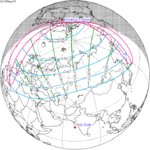 Partial |
1.0647 | 123 | November 3, 1975 Partial |
−1.0248 | |
| 128 | April 29, 1976 Annular |
0.3378 | 133 | October 23, 1976 Total |
−0.327 | |
| 138 | April 18, 1977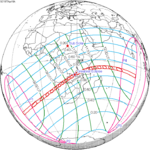 Annular |
−0.399 | 143 | October 12, 1977 Total |
0.3836 | |
| 148 | April 7, 1978 Partial |
−1.1081 | 153 | October 2, 1978 Partial |
1.1616 | |
Saros 118
[edit]This eclipse is a part of Saros series 118, repeating every 18 years, 11 days, and containing 72 events. The series started with a partial solar eclipse on May 24, 803 AD. It contains total eclipses from August 19, 947 AD through October 25, 1650; hybrid eclipses on November 4, 1668 and November 15, 1686; and annular eclipses from November 27, 1704 through April 30, 1957. The series ends at member 72 as a partial eclipse on July 15, 2083. Its eclipses are tabulated in three columns; every third eclipse in the same column is one exeligmos apart, so they all cast shadows over approximately the same parts of the Earth.
The longest duration of totality was produced by member 34 at 6 minutes, 59 seconds on May 16, 1398, and the longest duration of annularity was produced by member 59 at 1 minutes, 58 seconds on February 23, 1849. All eclipses in this series occur at the Moon’s descending node of orbit.[2]
| Series members 57–72 occur between 1801 and 2083: | ||
|---|---|---|
| 57 | 58 | 59 |
 February 1, 1813 |
 February 12, 1831 |
 February 23, 1849 |
| 60 | 61 | 62 |
 March 6, 1867 |
 March 16, 1885 |
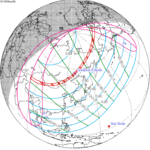 March 29, 1903 |
| 63 | 64 | 65 |
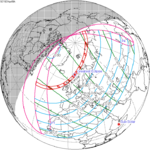 April 8, 1921 |
 April 19, 1939 |
 April 30, 1957 |
| 66 | 67 | 68 |
 May 11, 1975 |
 May 21, 1993 |
 June 1, 2011 |
| 69 | 70 | 71 |
 June 12, 2029 |
 June 23, 2047 |
 July 3, 2065 |
| 72 | ||
 July 15, 2083 | ||
Tritos series
[edit]This eclipse is a part of a tritos cycle, repeating at alternating nodes every 135 synodic months (≈ 3986.63 days, or 11 years minus 1 month). Their appearance and longitude are irregular due to a lack of synchronization with the anomalistic month (period of perigee), but groupings of 3 tritos cycles (≈ 33 years minus 3 months) come close (≈ 434.044 anomalistic months), so eclipses are similar in these groupings.
| Series members between 1866 and 2200 | ||||
|---|---|---|---|---|
 March 16, 1866 (Saros 108) |
 December 13, 1898 (Saros 111) |
|||
 September 12, 1931 (Saros 114) |
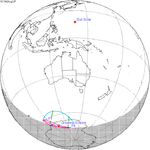 August 12, 1942 (Saros 115) |
 July 11, 1953 (Saros 116) |
 June 10, 1964 (Saros 117) | |
 May 11, 1975 (Saros 118) |
 April 9, 1986 (Saros 119) |
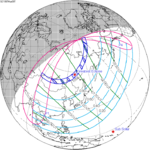 March 9, 1997 (Saros 120) |
 February 7, 2008 (Saros 121) |
 January 6, 2019 (Saros 122) |
 December 5, 2029 (Saros 123) |
 November 4, 2040 (Saros 124) |
 October 4, 2051 (Saros 125) |
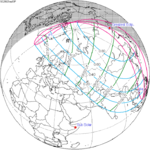 September 3, 2062 (Saros 126) |
 August 3, 2073 (Saros 127) |
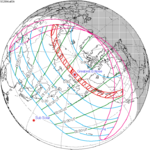 July 3, 2084 (Saros 128) |
 June 2, 2095 (Saros 129) |
 May 3, 2106 (Saros 130) |
 April 2, 2117 (Saros 131) |
 March 1, 2128 (Saros 132) |
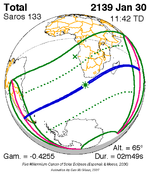 January 30, 2139 (Saros 133) |
 December 30, 2149 (Saros 134) |
 November 27, 2160 (Saros 135) |
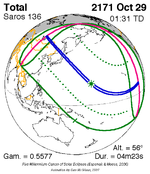 October 29, 2171 (Saros 136) |
 September 27, 2182 (Saros 137) |
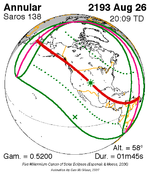 August 26, 2193 (Saros 138) | ||||
Metonic series
[edit]The metonic series repeats eclipses every 19 years (6939.69 days), lasting about 5 cycles. Eclipses occur in nearly the same calendar date. In addition, the octon subseries repeats 1/5 of that or every 3.8 years (1387.94 days). All eclipses in this table occur at the Moon's descending node.
| 21 eclipse events between July 22, 1971 and July 22, 2047 | ||||
|---|---|---|---|---|
| July 22 | May 9–11 | February 26–27 | December 14–15 | October 2–3 |
| 116 | 118 | 120 | 122 | 124 |
 July 22, 1971 |
 May 11, 1975 |
 February 26, 1979 |
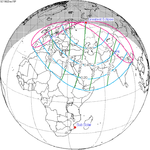 December 15, 1982 |
 October 3, 1986 |
| 126 | 128 | 130 | 132 | 134 |
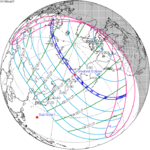 July 22, 1990 |
 May 10, 1994 |
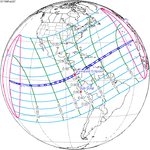 February 26, 1998 |
 December 14, 2001 |
 October 3, 2005 |
| 136 | 138 | 140 | 142 | 144 |
 July 22, 2009 |
 May 10, 2013 |
 February 26, 2017 |
 December 14, 2020 |
 October 2, 2024 |
| 146 | 148 | 150 | 152 | 154 |
 July 22, 2028 |
 May 9, 2032 |
 February 27, 2036 |
 December 15, 2039 |
 October 3, 2043 |
| 156 | ||||
 July 22, 2047 | ||||
References
[edit]- ^ van Gent, R.H. "Solar- and Lunar-Eclipse Predictions from Antiquity to the Present". A Catalogue of Eclipse Cycles. Utrecht University. Retrieved 6 October 2018.
- ^ "NASA - Catalog of Solar Eclipses of Saros 118". eclipse.gsfc.nasa.gov.
External links
[edit]- Earth visibility chart and eclipse statistics Eclipse Predictions by Fred Espenak, NASA/GSFC
- TimeAndDate.com: May 11, 1975 Partial Solar Eclipse appearance
- Preliminary results of observations of the solar eclipse of May 11, 1975 (Russian report)
- Partial Eclipse of the Sun: 1975 May 11 Archived 2012-12-24 at archive.today HM Nautical Almanac Office




